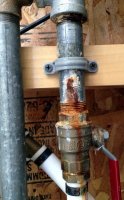Hi guys, I noticed this pipe in my plumbing closet looks kind of damaged. Can someone give me an idea what is going on with it and if it is in danger of breaking? I think it has looked like this a long time but I just realized maybe I shouldn't be ignoring it? This is the pipe that comes out of my tankless water heater.
Galvanized steel. Need advice on this pipe
- Thread starter leelee77
- Start date

